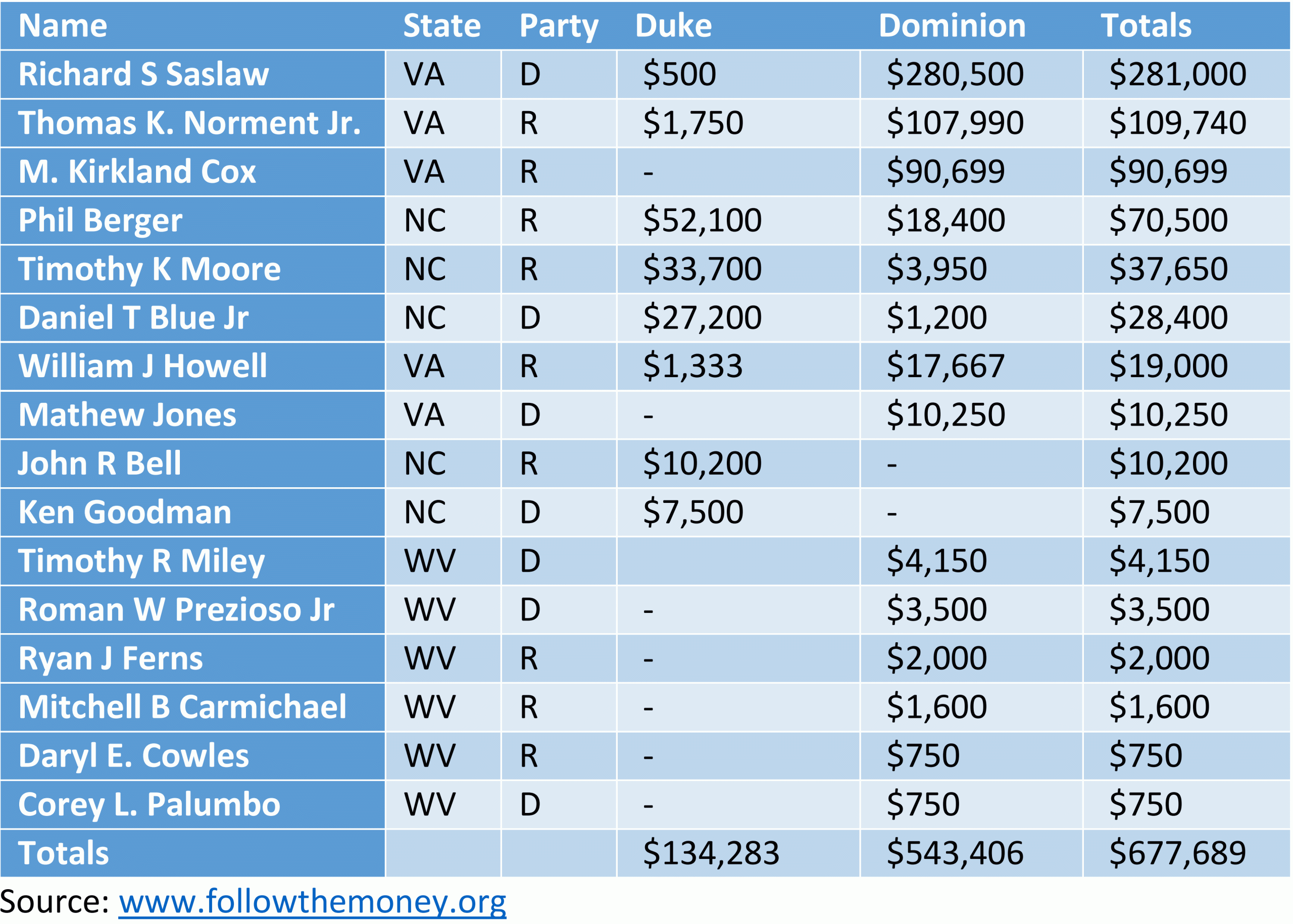
Not News: Politicians Take Hundreds of Thousands of Dollars from Pipeline Companies, Sign Letter Supporting Pipeline Project
What unites Democrats and Republicans from three states that signed a letter supporting the Atlantic Coast Pipeline? Hundreds of thousands in campaign money.
Earlier this month, leaders from both sides of the aisle in the Virginia, West Virginia, and North Carolina state legislatures sent a letter to federal regulators supporting the proposed Atlantic Coast Pipeline. The show of bipartisan support was touted as evidence of the pipeline’s universal appeal, but the real common ground here is the more than $675,000 these 16 elected officials received in campaign contributions from the pipeline’s would-be owners – Duke Energy and Dominion Resources.
Table: Campaign Contributions From Duke Energy & Dominion Resources to Signers of Support Letter for Atlantic Coast Pipeline
Legislators in Virginia got 75% of the money as the state has lax campaign finance rules, with unlimited contributions from corporations and individuals. But every signatory has received something from one of these two companies over their electoral career; even those in West Virginia where contribution limits are the tightest.
The proposed 600-mile pipeline, which would carry fracked gas from West Virginia over the Allegheny highlands through Virginia to North Carolina, has become a hotly contested project. Opposition along the pipeline route has flared up around the threat to mountains, rivers, local water sources, public safety, environmental justice, climate change and use of eminent domain for private gain.
It’s even become an issue in Virginia’s upcoming gubernatorial race.
Tom Perriello, who emerged earlier this year as a challenger to Democratic establishment favorite Ralph Northam, has distinguished himself in large part by his opposition to both the ACP and the Mountain Valley Pipeline (MVP). Perriello has gone so far as to renounce Dominion money, further differentiating himself from Northam, who by Dec 31, 2016 had accepted $20,000 in cash contributions from Dominion.
It goes to show that party affiliation doesn’t necessarily define support for new fossil fuel infrastructure, but taking money from fossil fuel companies might.
In their letter in support of the Atlantic Coast Pipeline, legislators say the pipeline would help the region’s economy, and poses no threat to the states’ “priceless natural resources”. They go as far as to say the pipeline would protect the region’s environment, citing the oft-repeated fallacy that gas-power electricity is “cleaner” than burning coal for electricity.
But let’s look at the facts.
These pipelines are not needed.
In their permit applications, the pipeline developers present contracts for pipeline capacity to demonstrate the need for additional gas in the region. But the details show that in the case of ACP, 80% of the gas has been contracted by Duke and Dominion subsidiaries. No genuine market demand has been established beyond the companies contracting with themselves. This “self-dealing” is also taking place on the MVP project, where 100% of the capacity is contracted by the project partners. Politicians are parroting the companies’ line on market need without any evidence that there is one.
With residential gas demand in decline, and the future of gas-fired power increasingly challenged by clean energy and efficiency, the companies’ optimism for the future market for gas sound like wishful thinking.
Why would companies invest in pipeline capacity that may not get used? Because the Federal Energy Regulatory Commission (FERC) sets high rates of return for pipelines, over 12% in many cases, and those pipeline rates then get folded into electricity rates. Indeed, utilities and gas producers are hard pressed, as we all would be, to find rates of return as high for any other endeavor.
Using the regulated rate structure to incentivize infrastructure build is a legacy of an era when population was growing fast and economic growth and energy demand were closely linked. Today population growth is slow and the link between the economy and energy demand has been broken by efficiency. Therefore, the old soundbites on energy infrastructure and the economy no longer ring true.
With clean renewable energy and efficiency competing on cost with gas and coal fired power, locking ratepayers into paying for gas infrastructure limits choice and costs them dearly.
Gas Pipelines are an Environmental Risk
The legislators’ letter refers to the environmental assessment released by FERC last December when claiming that the pipeline poses “no threat to our states’ priceless natural resources.” But FERC’s assessment leaves out so much information that stakeholders have called for it to be redone noting that it’s, “so utterly lacking in meaningful analysis of the project’s environmental impacts as to be useless to the public and insufficient to meet FERC’s own legal requirements.”
These pipelines are threatening old growth forest, removing mountain tops, being buried in unstable karst geology, crossing hundreds of creeks and rivers, threatening endangered wildlife habitat, carving up the Appalachian Trail, placing toxic compressor station facilities amid low income, African American communities, will trigger more destructive fracking in West Virginia and Pennsylvania, and pose a threat to our climate on a massive scale. It is a fact that we cannot rely on any fossil fuel to solve the climate crisis and we need to start now to manage a transition away from all fossil fuels.
The communities affected by these pipelines, as well as all of us that care for social and ecological justice, are not represented by the ‘leaders’ that signed this letter.
It’s clear that whether Republican or Democrat, campaign money from Duke and Dominion buys support for their pipeline projects, and the misinformation they spread.

